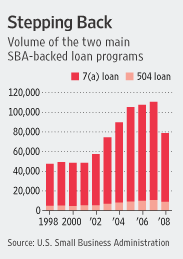I just received a copy of a new study from the NFIB Research Foundation looking at the current state of small business credit.
First of all, the recession is clearly on the minds of many small business owners. One-third (34%) of small business owners, defined as small employers having 250 or fewer employees, think the nation’s financial problems have “significantly” affected their business and one-quarter (26%) think it threatens their survival.
So what is their short term worry? Is it access to credit or the real estate crisis as those in Washington seem to be fixated on right now? Nope. Here are their immediate worries in order of importance:
-
45% responded that slow or lost sales
-
23% the unpredictability of business conditions
-
9% falling real estate values
-
9% an inability to obtain credit.
Since the beginning of early September, 30% of small employers applied for credit in one form or another, at least half of which applied more than one time (after all, persistence is one of our virtues). Of those 70% who did not apply, 12% of them (8% of the population) did not apply because they thought they could not get credit they wanted.
Of those who went after credit since September, 41% obtained all the credit they wanted, while 8 percent obtained most of it. We are consistently told that nobody can get credit, but half of small business owners who tried got all or most of what they asked for! In addition, 14% got some of what they asked for. That makes it two-thirds of those who tried got at least some credit.
As one would expect, the ability to obtain credit appears statistically related to financial strength, as measured by greater sales growth in the last two years, fewer mortgages taken out to finance other business activity, fewer upside-down properties, as well as the owner’s positive evaluation of firm performance against the competition, and firm maturity, more specifically, years of operation.
Discouraged borrowers, that is, owners who do not attempt to borrow for fear of rejection, are statistically related to what appears to be weak balance sheets. Specifically, falling real sales over the last two years, ownership of more upside-down properties, lesser use of real estate for collateral, more mortgages taken out to finance other business activity, and the owner’s negative evaluation of firm performance against the competition.
Financial institutions have changed the terms or conditions of a line of credit loan, line or credit card for 18 percent of small employers. The changes include a lower limit on a credit card or higher interest on a line of credit, though not all changes, particularly with respect to lines, were adverse.
Trade credit (borrowing from suppliers) is growing more difficult to procure. Of the 80 percent who use trade credit, 30% think it has been getting tighter since early September, 14% a lot tighter, while 46% see no change.
Small business owners are heavily invested in real estate. A whopping 96% own their personal residence, 49% own all or part of the building and/or land on which their business sits (excluding the one-quarter who operate primarily from the home), and 41% own investment real estate, excluding their residence and business.
Real estate, particularly home mortgages, is frequently used to finance or collateralize other business assets. 76% percent have at least one mortgage on the real estate they own with 13% having three or more mortgages. 22% have taken out at least one mortgage to finance business activities. 16% use real estate to collateralize other business assets, including 10 percent who use their homes as collateral. 9% own at least one currently upside-down property.

